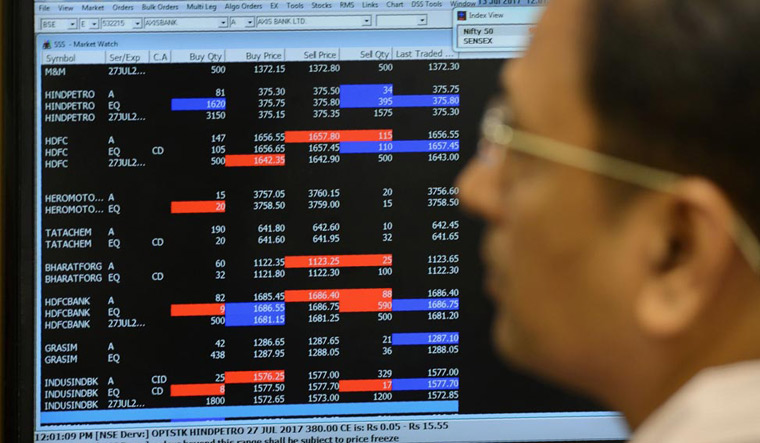India's benchmark equity indices slipped for the fourth straight session, marking their biggest weekly fall in ten weeks, amid a sharp rise in US bond yields on expectations of Federal Reserve turning more aggressive, and surging price of crude oil, that will put pressure on India's current account deficit.
Uncertainties over whether the BJP government will be able to prove its majority in Karnataka also dampened market mood.
The BSE Sensex closed 301 points or 0.9 per cent lower at 34,848.30 points and the Nifty50 ended 86 points or 0.8 per cent lower at 10,596.40 on Friday.
"The Supreme Court direction to B.S. Yeddyurappa to seek vote of confidence on Saturday weakened the market that was already reeling under the international cues of rising bond yields and the surging crude oil prices," said V.K. Sharma, head of private client group at HDFC Securities.
Strong economic data has raised speculation that the US Fed will raise interest rates at a faster pace, which fueled bond yields. On Thursday, the US 10-year treasury note rose to 3.109 per cent—its highest level since July 2011—while the 30-year bond yield jumped to 3.245 per cent—highest level since June 2015.
Of the 30-share Sensex, 23 stocks ended in the red on Friday. Auto, banks and capital goods stocks were among the big losers. Some of the bluechip stocks that dragged the markets lower included Larsen & Toubro (- 3.5 per cent), ICICI Bank and Sun Pharma (-3.2 per cent), Tata Steel (-3 per cent), Wipro (-2.9 per cent) and Maruti Suzuki (-2.3 per cent).
Shares of Avenue Supermarts, the operator of D-Mart supermarket chain, plunged more than five per cent, after it announced that promoter Radhakishan Damani would sell up to one per cent of his shareholding in the company. The share sale is being done in order to meet Securities and Exchange Board of India's requirement of listed firms maintaining a minimum public shareholding of 25 per cent. As of March-end, promoters held 82.2 per cent stake in the company. Avenue Supermarts has accelerated over 300 per cent since its blockbuster listing in 2017.
"Further up move in crude prices or rising yields is likely to be negative for markets. Eyes will also be on developments in US-China trade negotiations. Volatility is likely to remain with negative global cues and foreign institutional investors selling," said Teena Virmani, vice president research at Kotak Securities.
FIIs sold equity worth Rs 5,552 crore in April, and in May have so far sold Rs 4,830 crore worth stocks, according to data from depositories.
The biggest worry is crude oil, which has risen close to 20 per cent in 2018 hitting $80 a barrel intraday earlier this week. Investment bank Goldman Sachs recently raised India's current account deficit forecast to 2.4 per cent of GDP from 2.1 per cent for the current financial year ending March 2019.
Rising crude oil prices will also push inflation higher this year.
"The recent spike in oil prices following the withdrawal of the US from the Iran nuclear deal poses additional upside risks to our headline inflation forecasts," said Goldman Sachs economist Nupur Gupta.
That, coupled with better activity data, will turn Reserve Bank of India more hawkish in the bi-monthly monetary policy next month, although it may leave the Repo rate unchanged, awaiting more clarity on monsoon rains and the impact of minimum support price (MSP) hike on summer crops, Gupta added.


